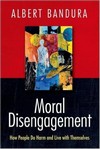Moral disengagement
 Moral disengagement / Albert Bandura
Moral disengagement / Albert Bandura
New York: Worth, 2016. 542 p.
How do otherwise considerate human beings do cruel things and still live in peace with themselves? Drawing on his agentic theory, Dr. Bandura provides a definitive exposition of the psychosocial mechanism by which people selectively disengage their moral self-sanctions from their harmful conduct. They do so by sanctifying their harmful behavior as serving worthy causes; they absolve themselves of blame for the harm they cause by displacement and diffusion of responsibility; they minimize or deny the harmful effects of their actions; and they dehumanize those they maltreat and blame them for bringing the suffering on themselves. Dr. Bandura’s theory of moral disengagement is uniquely broad in scope. Theories of morality focus almost exclusively at the individual level. He insightfully extends the disengagement of morality to the social-system level through which wide-spread inhumanities are perpetrated. In so doing, he offers enlightening new perspectives on some of the most provocative issues of our time, addressing:
Moral disengagement in all aspects of the death penalty—from public policy debates, to jury decisions, to the processes of execution
The social and moral justifications of major industries—including gun manufacturers, the entertainment industry, tobacco companies, and the world of "too big to fail" finance Moral disengagement in terrorism, and how terrorists rationalize the use of violence as a means of social change
Climate change denial, and the strenuous efforts by some to dispute the overwhelming scientific consensus affirming theimpact of human behavior on the environment.
